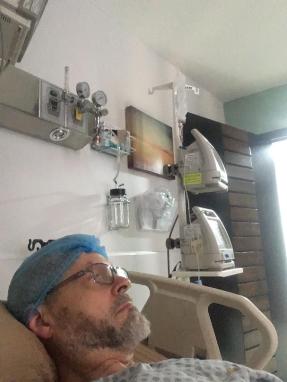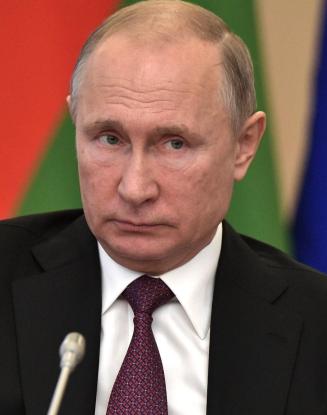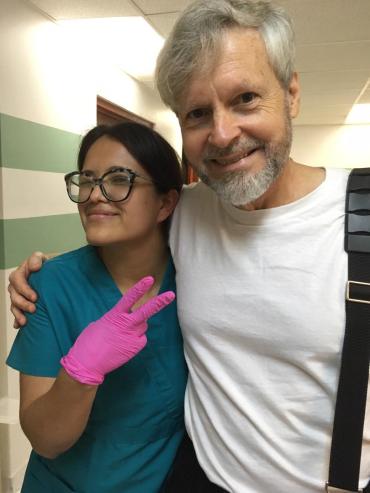I’m finishing up the story of my victory over prostate cancer with the help of the Immunity Therapy Center in Tijuana, having been left to die by our American health-care system. Below is a passage from the final chapter.
I’m one man—and a man, at that, who’s never liked doctors’ offices or hospitals and doesn’t particularly trust authority. I’m getting old; and in the twilight of my day, I developed a life-threatening health problem. I sought help… and none was given. My Medicare was charged over and over for costly articles concealing a ridiculous amount of redundancy and for needless office visits. At the same time, those articles (and I mean catheters, primarily) were never anything approaching a cure for my condition, and those office visits were spaced so far apart that my initial cancer had three months’ grace to metastasize. Meanwhile, simply diagnosing the disease, which should have been Job One, was overlooked by the staffs of two clinics for two of those months; and after the diagnosis was finally addressed by one clinic, I didn’t learn of it personally for yet another month.
I was dropped and kicked around like a football where twelve-year-olds scramble across the muddy field of some Middle School playground on a rainy October afternoon. There was truly an incompetence reminiscent of a childish game about it all. While most of the nurses I met face to face were caring people, the medical establishment in general showed me little respect. My health and my life were obviously not of any consequence to “them”, the gears and pistons of a faceless bureaucratic machine. When, at long last, I understood that my life might well be cut short by cancer, the responses I encountered were of two sorts: 1) palliatives were offered to render death as painless as possible, and 2) calls were never answered and my appeals for help were utterly ignored. I suppose Number Two, properly speaking, would be a persistent non-response.
This is one man’s experience, in the grip of one dreadful disease, when transiting through the labyrinth of the “greatest health care system in the world”. I place that phrase in ironic quotation marks because, of course, I consider my experience a miserable one. I would sooner consult an old curandera with her basket full of herbs than return to the *** Clinic or to ___ Urology. Now, I am but one man, and I’ve had no significant experiences of our system other than the one described in this book. Maybe I’m a statistical outlier. I don’t know how to rebut that proposition conclusively. Maybe I’m just Mr. Hard Luck.
That theory doesn’t really handle the embarrassing evidence, though, that anyone can find in our medical establishment’s rates of cancer recidivism. I saw an appalling number of people at the Immunity Therapy Center who had cycled through years of conventional, mainstream therapy in the US—and who were in terrible shape, not in spite of their surgery + chemo + radiation, but because of it. Liz once told me (probably with a smile behind her mask) that they called patients like me “cancer virgins”, in allusion to our having lived through none of the mainstream treatments at all. We were the ones who responded best to therapy. Although the American “toxic trifecta” will often kill cancer cells, the problem is that most living cells in the tumor’s vicinity also die. For a year, two years—maybe three or four—the patient’s blood comes back free of the disease; but if a loose-floating cancer cell proceeds to multiply anywhere in the body now, the natural resistance mounted against it is far less than a healthy body’s would be. Indeed, two of our system’s three favorite treatments are themselves carcinogenic—and recall that we all have had cancer cells somewhere in our body from birth. The temporary eradication of detectable cancer, therefore, usually comes at the cost of creating a cancer-tolerant environment whenever the disease decides to flare up again.
Am I just complaining to grandstand? Am I just “one of those”—an enemy of the establishment who strokes his ego by assuming avant-garde or “woke” postures? You can pigeon-hole me wherever you please, wherever the result gives you the best night’s sleep… but one thing I’m most definitely not is a far-left radical. A classical liberal I may well be, in the strict sense of believing in the value of individuality—in the essential right of individuals to live free, to enjoy liberty: the right to try, to fail, and to learn. Yet that’s a sense of the word which nobody understands any more (though it animates our Declaration of Independence and Constitution as “liberal” documents).
No, I’m not “out to get” the American way. It’s not my fault that our way has been lost, not by me, but by both of our political parties. Republicans are supposed to say that this health-care system, for all its flaws, remains the best the world has ever seen. Democrats are supposed to counter that the system refuses to offer equal health care for all and seems preoccupied, instead, with enriching pharmaceutical companies. Republicans answer that companies have a right to a profit, and that, indeed, without profits to reinvest in research, American enterprises would not lead the world in the development of miraculous new drugs. Democrats volley with the sneer that a lot of the profit never finds its way to the lab, and that what comes out of the lab is designed more for mass-marketing than for effective, lasting treatment.
I could strike a pose and grandly cry, “Calm down, ladies and gentlemen. There’s some truth on both your sides. We must work together…” and so on, and so on. In the meantime, both sides will have written me off as belonging to the other if I show myself weak-kneed on a single article of their manifesto. The truth, however, is that I don’t know where the truth lies: I’m just pretty sure there’s not much of it on either of these sides. Our American labs do indeed develop miraculous treatments and technologies… and then those marvels are left for physicians in other nations to offer their patients, because a) existing treatments here can yet be milked for so much money (as per the Democrats’ accusation); and b) any treatment must have a 100 percent guarantee of success, or else the “victimized” patient can sue the doctor for millions (a state of affairs ushered in by Democrat mega-bureaucracy and “lawyer-ocracy”).
But Republicans, for their part, don’t seem very interested in sustaining a sensible, anti-statist, “Tea Party” side of the argument. They know that no state-run system can supply uniform health care to every member of a vast nation—that a cutting-edge treatment will always be costly, and that providing it to all who need it could bankrupt the system in many specific instances. They know that lawsuits further drive up the cost of care for consumers, and that watchdog agencies like the FDA too often simply screen the gold-mining of pharmaceutical mega-corporations that have slipped donations into the right hands. These are hymns from their base’s hymnal, but the Honorable Representative So-and-So echoes the lyrics of a different creed when Congress takes a vote.
Look at the current brouhaha over drugs like hydroxichloroquine and, just lately, an extract from the oleander plant. I myself certainly don’t know whether there is merit to pursuing these prospective treatments for CV-19 or not… but people who have no more knowledge than I have staked out a position passionately, based (it appears) on nothing but their “R” or “D” affiliation. The R’s contend that we should encourage further research into any treatment until it can be conclusively proved ineffective or dangerous; and, further, that willing individuals should be allowed access to such treatment if they find the element of risk acceptable. The D’s, in contrast, insist that not a dime should be spent on theoretical cures that don’t have the weight of big-league names behind them; and, further, that no individual should ever be allowed to select a treatment, no matter how resigned to risk he may be, that the paternalistic SuperNanny of centralized government hasn’t approved officially.
These positions are the precise opposite of those which the R’s and D’s occupy on cancer drugs and treatment. There, the R’s defend what I call the Medi-Pharm Complex’s supreme authority to dictate where we can go for therapy and what therapies we may receive. The D’s cry foul, claiming as individuals of free will the inalienable right to risk their lives in submitting to a new therapy that might save their lives. Now, suddenly, the latter sound like the true liberal of the nineteenth century, while the former sound like totalitarian statists who are about one move away from making us all have chips implanted into our skulls.
Do I have a “political view” on all this? In the terms used to define politics these days, I would say “no”. I would argue that my view is mere common sense. I’m not interested in promoting any broad agenda: I just want the freedom to live out my own little life like a responsible adult with a functional brain. Let me try something that may work… and if it doesn’t work, deprive me of the right to sue my suppliers for not shouting in my ear with a bullhorn, “There’s a risk!” Let me possibly mess up, as long as I have a chance of succeeding. Don’t measure me for a coffin and then offer me a few months’ worth of joints until I stop moving and can be settled into my new, permanent home. Treat me with some respect.
Why is that political? I am one man. Let me breathe. Stop rationing my air.
Isn’t it ironic (in this unending chain of human ironies) that Mexico, our dysfunctional neighbor to the south whose government rests on the spectrum somewhere between socialism and brigandism, allows individuals the freedoms that they once enjoyed up here? No, the Mexican state doesn’t secure those freedoms well, and few can reliably access them. Most of the “allowance” is off the books, off the radar. But when so much is regulated and policed, the system becomes overloaded. It also loses its vibrancy, if carried to the extreme. People stop working, because there’s no point: you can’t keep what you earn, you can’t profit from your own ideas, and you can readily disappear for protesting. So…
So certain little enterprises are permitted to prosper in the underbrush, like the mavericks—the cimarrones—that broke away from the original Spanish herds and became the longhorn breed. They aren’t enough of a threat to round up, and the government doesn’t really want to waste energy and resources in rounding them up—especially when they also generate tax revenue and attract foreign visitors with full wallets. My Mexican benefactors sent me home with instructions to inject myself four times a week. Oh, the lawsuits, if I were to draw the wrong amount from the vial! Oh, the lawsuits, if I were to harm myself! I was sent away with the implicit assumption that I was a responsible adult. When is the last time my own nation, the self-styled Land of the Free, made such flattering assumptions about me?
My politics? If by that word you mean “broad agenda”, I have none. Capitalism worked well for our medical establishment until a few entities prospered too handsomely: then we had, not a free-market economy, but rule by Mogul emperors. That each emperor was nominally a private-sector actor when tax forms were filled out was an irrelevancy; for the emperors have come to own the public sector, and our watchdogs—our SuperNannies—are mere puppets on private, behind-the-scenes strings.
Socializing our system wouldn’t have made my journey any easier. In fact, look at my path and tell me that it doesn’t resemble a nightmarish trek across the terrain of socialized medicine. Long waits, one-size-fits-all prescriptions and treatments, shameless profiteering by peripheral private concerns that supply the public machine, cut-your-losses negligence of cases that have grown complex or fallen between the bureaucratic cracks… I already know what socialized medicine looks like. We have it right here, right now, in the US of A.
And, yes, to the extent that we don’t, it’s because the unholy alliance between the stethoscope team and the lab-coat team makes higher profits when government doesn’t mandate fixed costs for drugs. But it’s government that prevents the free market from forcing costs down by allowing patients the option of alternative treatments. It’s the government that conspires with the Medi-Pharm Complex to punish those who dare to go off the grid for help. I can’t even claim my flights to and from San Diego as medical expenses on my income tax—but I will have to pay tax on the investments I had to liquidate in order to finance the saving of my life.
With freedom like that, who needs oppression? With capitalist cronyism like that, who needs socialism?
“The same people keep getting themselves killed”: I’m constantly remembering that old French saying. What hope is there for us? The hope of life under the radar, between the cracks—the hope I place in individual human beings who persist in finding a way to be humane. Maybe we don’t need a new system; maybe we need as little system, in fact, as we can possibly get away with. Maybe the more we try to fix things so that we answer everyone’s problem, the more we force everyone to be that abstract Citizen whose problems are all answered on the “Frequently Asked Questions” page. Maybe, to the extent that we have a system, it needs to be characterized by flexibility—by adaptation to local and individual circumstances: by a liberality of chances both for those seeking help and those offering it. Maybe we just need to get out of our own way.




